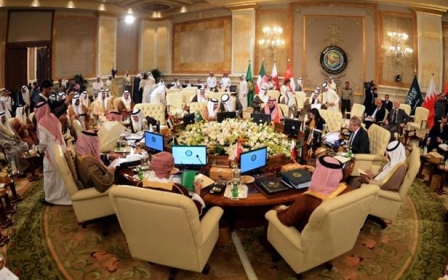Analysis: IS fears make Gulf monarchies set aside differences

Advances by militants in Syria and Iraq, and US calls for a coalition against them have made Gulf monarchies set aside disputes over Qatar's support for the Muslim Brotherhood, analysts say.
Wary of spectacular gains made by Islamic State militants, the oil-rich monarchies fear the militants could advance towards their own borders, where the group could find support.
"The biggest danger (in the Gulf) comes now from these (emerging) terrorist groups, and not from the Muslim Brotherhood," said Abdulaziz Sager, head of the Gulf Research Centre think-tank.
Qatar's relations with Saudi Arabia, the United Arab Emirates and Bahrain sank to a new low in March when the three governments withdrew their ambassadors from Doha, accusing it of meddling in their affairs and supporting the Brotherhood -- designated as "terrorist" by Riyadh.
For Sager, the UAE was "the strictest" against Qatar among the Gulf Cooperation Council countries.
UAE State Minister for Foreign Affairs Anwar Gargash wrote on Twitter Sunday that his country's interest lies "in a strong Arab Gulf... sheltered from regional differences."
Speaking to reporters following a meeting of Gulf Arab foreign ministers, Kuwait's top diplomat Sheikh Sabah Khaled Al-Sabah said that the six-months spat with Qatar was on its way to being resolved.
He said the ambassadors could return to their posts "at any time", without giving a specific date.
The announcement came as Saudi King Abdullah underscored the threat posed by IS militants unless there is "rapid" action.
"Terrorism knows no border and its danger could affect several countries outside the Middle East," Abdullah was quoted as telling ambassadors, including the US envoy, on Friday.
"If we ignore them, I am sure they will reach Europe in a month and America in another month," he warned.
Saudi authorities have long feared blowback from militant groups, particularly after a spate of Al-Qaeda attacks in the kingdom from 2003 to 2006.
IS beliefs supported by people in the Gulf
Kuwaiti political analyst Ayed al-Manaa agrees that "we now have a fear which is much bigger than the differences in foreign policies, with IS taking over one third of Syria and Iraq".
"IS as an ideology is not only present in (Iraq and Syria). It is present in our countries and is waiting for the opportunity to appear," said Manaa.
"The political disputes (with Qatar) are no longer a priority... We live in danger from northeast Syria and northwest Iraq. This is an alarm bell for GCC nations to end their differences."
GCC states on Saturday said they are ready to act "against terrorist threats that face the region and the world".
The foreign ministers of Bahrain, Kuwait, Oman, Qatar, Saudi Arabia and the UAE -- the six GCC states -- also pledged a readiness to fight "terrorist ideology which is contrary to Islam".
However, "we are waiting for more details to understand what is needed" for the coalition proposed by US President Barack Obama, said Sabah.
Obama said he was developing a broad plan that would involve military, diplomatic and regional efforts to defeat the IS.
Obama said he would dispatch US Secretary of State John Kerry to the Middle East to discuss the plan with regional allies, including the Gulf Arab states.
Regional expert Frederic Wehrey said that "the GCC does not have the capacity for real expeditionary military operations outside the Gulf.
"The question is what military value would they bring beyond the symbolic legitimacy of Arab participation," said Wehrey of the Carnegie Endowment for International Peace.
Sagar agrees, pointing out that the participation of GCC leader Saudi Arabia, would be limited to "intelligence" and the kingdom's "ability in influencing public opinion in the Muslim world."
Saudi Arabia's top cleric has already branded Al-Qaeda and IS militants as "enemy number one" of Islam and warned young Muslims to steer clear of "calls for jihad" issued on "perverted" grounds.
Saudi Arabia behind new GCC stance towards Qatar
Meanwhile, the website Arabi 21 said Saudi Arabia was behind the GCC's improvement of ties with Qatar.
"Saudi Arabia mediated with the UAE and that it has shifted from the position a party to the conflict to the position of a mediator," an unnamed source in the Gulf told Arabi 21, adding that "the UAE was angry because it sought an escalation with Doha."
According to the source, "Saudi Arabia is seeing a more comprehensive picture of the region," amid fears of militants in Syria with those in Iraq, while "the UAE is focusing on the narrow enmities with the Muslim Brotherhood, Qatar and Libya."
The source also added that Saudi Arabia is not pleased with Egypt's positive stance towards the Iraqi government, which has been a vocal critic of Riyadh.
Egyptian president Abd al-Fattah Al-Sisi expressed his support to former Iraqi Prime Minister Nuri al-Malki, while Egyptian Foreign Minister visited Baghdad soon after Sisi took office.
Stay informed with MEE's newsletters
Sign up to get the latest alerts, insights and analysis, starting with Turkey Unpacked
Middle East Eye delivers independent and unrivalled coverage and analysis of the Middle East, North Africa and beyond. To learn more about republishing this content and the associated fees, please fill out this form. More about MEE can be found here.




